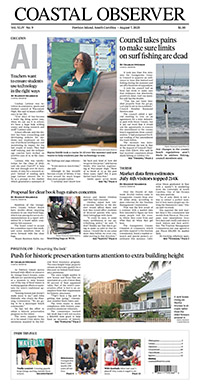Beaches
Corps considers lowering a hurdle to renourishment

The Army Corps of Engineers is considering a change to the language of the easements it requires from property owners in order to conduct beach renourishment projects.
But that change isn’t likely to happen before a Corps project to replace sand on the south end of Pawleys Island that was lost to erosion during Hurricane Ian in 2022, said Brig. Gen. Daniel Hibner, commander of the Corps’s South Atlantic Division.
“We don’t need easements in perpetuity. We need them for the life of the project,” Hibner told the annual meeting of the S.C. Beach Advocates. “I think that’s the direction we’re heading.”
The nonprofit was formed in 2014 to represent the state’s coastal communities. Its annual meeting in North Myrtle Beach this week drew federal, state and local officials along with coastal scientists and engineers.
“We used to talk a lot about engineering; where to find the sand,” said Nicole Elko, a coastal geologist who is the Beach Advocates administrator. “It’s these legal challenges now that are really driving where we go next.”
The town of Pawleys Island completed a renourishment project in 2020 using local and state funds. It later entered into an agreement with the Corps that allowed the work on the south end of the island to become a federal project.
That provides access to federal funding for future renourishment and repairs over 50 years.
The town has obtained easements from all but three of the 113 beachfront property owners on the south end that are required before work can begin.
The town tried to condemn the easements, but the three owners successfully challenged those in Circuit Court. But the court allowed the town to bring new condemnation actions. The owners have appealed, seeking, among other things, to bar future condemnations.
“The easement is typically going to be one of your most challenging requirements,” Hibner said.
He understands the concern. The South Atlantic District stretches from North Carolina around Florida and along the Gulf Coast.
“I wouldn’t want to give an easement forever,” Hibner said. “I think there’s a more reasonable language.”
He noted that property owners also have concerns about the public access requirement in the easement. Those were cited in the Pawleys Island lawsuits.
“There’s a lot of misinformation about what that means,” Hibner said. “People think that means someone can set up a lawn chair on your deck and drink beer and go swimming in your swimming pool. And that’s not the case at all.”
It is access to the beach itself that is required.
“We’re going to make sure there’s a parking lot and there’s going to be designated ways to get on the beach and then that beach is their access,” Hibner said. “It’s not anything else.”
Pawleys Island Mayor Brian Henry said he was encouraged by what he heard. Henry serves on the Beach Advocates board.
“I was really pleased to hear some of the words about easements,” he said. “We’re at an impasse.”
While he understood the process to change the duration of the easements may be lengthy, he asked Hibner whether the Corps could codify its policy on public access.
“We have flexibility when we do these easements within our real estate districts,” Hibner said. He’s is working on a project in Florida “making sure they have the flexibilities so that it’s very clear about what public access means. And they generally do.”
He said the districts should be able “to provide reasonable easement language that makes sense. And that people know what they’re giving up and what they’re not.”
But Hibner also said the public access component was there for a purpose.
Since the public is funding the renourishment, “the public in general needs to get something back for their tax money, and that is that public access,” he said. “Our interpretation of it in the Corps of Engineers is the law requires that part.”
The issue is not unique to Pawleys Island. The town of Edisto Beach needs 189 easements to develop a renourishment project with the Corps, Mayor Crawford Moore said.
“How do we sell this? How do we make it work for the property owner?” he asked.
Like Pawleys Island, Edisto formed a beach committee. It also stressed that the easements are granted to the town, not the federal government.
“That was a big hurdle for us,” Moore said.
In Florida, two members of the House of Representatives introduced a resolution last month calling for Corps to change the perpetual easement requirement. It notes that while federal law prohibits participation in projects on private beaches, the Corps previously allowed its local partners to fund work in places where easements could not be obtained.
The agency “is retroactively applying its inflexible interpretation of law regarding perpetual easements which has resulted in widespread project delays for both traditional and emergency repair projects,” the lawmakers stated.
That resolution is making its way through committee.
Hibner told the Beach Advocates that he was in Florida last week with the assistant secretary of the Army for civil works, who raised the issue of amending the easements.
“I was blown away when he brought up the topic to me,” Hibner said. “I’m encouraged that maybe more palatable language will come out on that.”




